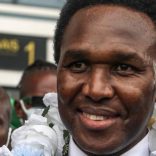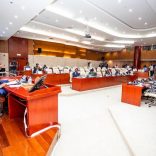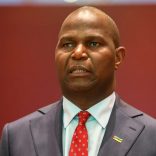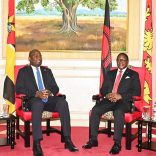Mozambique: Renamo militants in Massinga demand Momade’s resignation - AIM
Mozambique: President addresses the UN General Assembly, calls for support for countries that are helping to fight terrorism – Watch

Image: United Nations
Mozambican president Filipe Nyusi said on Tuesday that the support that Mozambique is receiving in the fight against terrorism is an example of how Africa can solve its problems, but pointed out that the forces on the ground need financing.
“This pioneering experience of combining bilateral and multilateral intervention is also an example of the resolution of African problems by Africans themselves. However, the question that arises is the need for substantial support to these countries, directly and indirectly helping us fight terrorism in Mozambique, in order to make ongoing operations sustainable,” Filipe Nyusi said when addressing the 78th annual session of the United Nations General Assembly in New York on Tuesday evening.
The Mozambique Armed Defence Forces have been fighting terrorism in the province of Cabo Delgado with the assistance of Rwanda and the Southern African Development Community (SADC). Attacks taking place there since October 2017 have conditioned the advancement of natural gas production projects in the region.
“We have been achieving visible successes on the ground, despite terrorists continuing to sporadically create terror and fear in isolated villages. With the improvement in order and tranquillity, populations have been returning en masse to their areas of origin, restarting life with normality,” Nyusi further stated.
The terrorist organisation Islamic State claimed to have executed 11 Christians last week in the district of Mocímboa da Praia, Cabo Delgado province, but sources interviewed by Lusa speak of at least 12 deaths on site and several injured in the attack in Naquitenge, a village in the interior of that district, on Friday.
The conflict in northern Mozambique has already displaced one million people, according to the United Nations High Commissioner for Refugees (UNHCR), and cost around 4,000 deaths, according to the ACLED conflict registration project.
“Right now, the challenge is the reconstruction of infrastructure and the consolidation of social cohesion,” Filipe Nyusi told the United Nations General Assembly, also asking for international support in this process.
In his speech, the Mozambican head of state focused on topics such as peace and security, combating terrorism, climate change, energy transition, the blue economy and environmental conservation.
“My own country, Mozambique, has experienced cycles of armed conflicts, sometimes fomented by forces antagonistic to national interests, but their resolution was only possible on the basis of constructive dialogue, based on trust and mutual respect. (…) In June this year, we closed the last base of Renamo, a party that remained armed, marking the conclusion of the Disarmament and Demobilization phase. The crucial phase now is the reintegration of former guerrillas into society, including the payment of their pensions, although [this is] not provided for in law,” Nyusi also said, recalling the support of the United Nations and other partners in this process.
The Disarmament, Demobilization and Reintegration (DDR) process, which began in 2018, covering 5,221 former guerrillas of the Mozambican National Resistance (Renamo), the largest Mozambican opposition party, of which 257 are women, ended last June with the closure of the last Renamo base in Vunduzi, in the district of Gorongosa in Sofala province.
In his speech yesterday, Filipe Nyusi also recalled the impacts of climate change in Mozambique, particularly the consequences of the three major cyclones in recent years: “To date, we have not yet been able to recover just one third of damages recorded.”
Nyusi further acknowledged that “support from partners has been far below their pledges and beyond the requirements “.
“In many cases, when this assitment comes, partners prefer to manage the funds outside agreed mechanisms with the government, causing overlaps in areas or programs which have little impact on the communities. As a consequence, substantial portion of funds are spent on capacity building, conferences and c bureaucratic issues, rather than allocating funds to affected populations, which once again shows lack of trust and solidarity,” Nyusi said.
Still concerning climate change , Filipe Nyusi said that “the countries that pollute the most continue to produce emissions that cause global warming and climate change”.
“The enrichment of these countries comes at the price of the misfortune of the countries that contribute the least to pollution, which coincidentally are the poorest countries,” Nyusi pointed out.
Filipe Jacinto Nyusi, President of the Republic of Mozambique, addresses the general debate of the 78th Session of the General Assembly of the United Nations (New York, 19 – 26 September 2023). Watch.












Leave a Reply
Be the First to Comment!
You must be logged in to post a comment.
You must be logged in to post a comment.